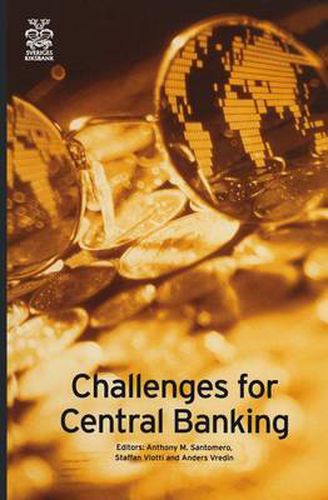Readings Newsletter
Become a Readings Member to make your shopping experience even easier.
Sign in or sign up for free!
You’re not far away from qualifying for FREE standard shipping within Australia
You’ve qualified for FREE standard shipping within Australia
The cart is loading…






This title is printed to order. This book may have been self-published. If so, we cannot guarantee the quality of the content. In the main most books will have gone through the editing process however some may not. We therefore suggest that you be aware of this before ordering this book. If in doubt check either the author or publisher’s details as we are unable to accept any returns unless they are faulty. Please contact us if you have any questions.
It may be possible to claim that, generally speaking, central banks around the world have never before held such a central and well-respected position in their respective countries as they hold now. Their tasks seem to be reasona bly well defined and the mandate given to them to guarantee price stability has so far worked more successfully than was perhaps expected. Inflation is lower than it has been for a long time. One central bank after the other has been given a position independent of normal party political processes. Re search concerning monetary policy and other topics of relevance for central banking has made good progress during the past decade. Much of the mys tique that has typically surrounded the internal work and decision-making of central banks has gradually disappeared. Instead, openness and transparency have become the key words of the day. The communication channels of central banks; speeches, inflation reports, minutes of meetings, etc. receive considerable attention and often give rise to headlines in the media. The en vironment in which central banks work and act today has thus undergone changes that in my view are very positive. However, we should always be on our guard against complacency. It would be most dangerous for central bankers today to sit back and relax in the belief that all of the important problems have been resolved and need no further consideration. Unless central bankers remain constantly alert and vigilant, their policy-making can easily deteriorate.
$9.00 standard shipping within Australia
FREE standard shipping within Australia for orders over $100.00
Express & International shipping calculated at checkout
This title is printed to order. This book may have been self-published. If so, we cannot guarantee the quality of the content. In the main most books will have gone through the editing process however some may not. We therefore suggest that you be aware of this before ordering this book. If in doubt check either the author or publisher’s details as we are unable to accept any returns unless they are faulty. Please contact us if you have any questions.
It may be possible to claim that, generally speaking, central banks around the world have never before held such a central and well-respected position in their respective countries as they hold now. Their tasks seem to be reasona bly well defined and the mandate given to them to guarantee price stability has so far worked more successfully than was perhaps expected. Inflation is lower than it has been for a long time. One central bank after the other has been given a position independent of normal party political processes. Re search concerning monetary policy and other topics of relevance for central banking has made good progress during the past decade. Much of the mys tique that has typically surrounded the internal work and decision-making of central banks has gradually disappeared. Instead, openness and transparency have become the key words of the day. The communication channels of central banks; speeches, inflation reports, minutes of meetings, etc. receive considerable attention and often give rise to headlines in the media. The en vironment in which central banks work and act today has thus undergone changes that in my view are very positive. However, we should always be on our guard against complacency. It would be most dangerous for central bankers today to sit back and relax in the belief that all of the important problems have been resolved and need no further consideration. Unless central bankers remain constantly alert and vigilant, their policy-making can easily deteriorate.